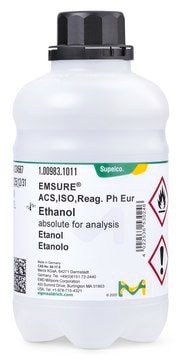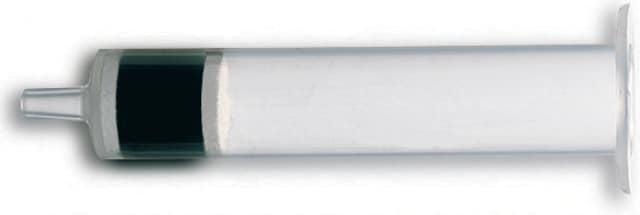34852
Ethyl alcohol, pure
≥99.8%, suitable for HPLC, absolute
Synonym(s):
Ethyl alcohol
About This Item
Recommended Products
Product Name
Ethanol, absolute, suitable for HPLC, ≥99.8%
vapor density
1.59 (vs air)
Quality Level
vapor pressure
44.6 mmHg ( 20 °C)
grade
absolute
Assay
≥99.8%
form
liquid
autoignition temp.
683 °F
expl. lim.
19 %, 60 °F
greener alternative product characteristics
Safer Solvents and Auxiliaries
Learn more about the Principles of Green Chemistry.
technique(s)
HPLC: suitable
impurities
≤0.001% free acid (as CH3COOH)
≤0.001% non-volatile matter
≤0.2% water (Karl Fischer)
≤1 ppb fluorescence (quinine) at 254 nm
≤1 ppb fluorescence (quinine) at 365 nm
transmittance
210 nm, ≥20%
225 nm, ≥50%
240 nm, ≥80%
260 nm, ≥98%
refractive index
n20/D 1.3600 (lit.)
bp
78 °C (lit.)
mp
−114 °C (lit.)
format
neat
greener alternative category
SMILES string
CCO
InChI
1S/C2H6O/c1-2-3/h3H,2H2,1H3
InChI key
LFQSCWFLJHTTHZ-UHFFFAOYSA-N
Looking for similar products? Visit Product Comparison Guide
General description
Caution
Footnote
Signal Word
Danger
Hazard Statements
Precautionary Statements
Hazard Classifications
Eye Irrit. 2 - Flam. Liq. 2
Storage Class Code
3 - Flammable liquids
WGK
WGK 1
Flash Point(F)
55.4 °F - closed cup
Flash Point(C)
13 °C - closed cup
Choose from one of the most recent versions:
Certificates of Analysis (COA)
It looks like we've run into a problem, but you can still download Certificates of Analysis from our Documents section.
If you need assistance, please contact Customer Support.
Already Own This Product?
Find documentation for the products that you have recently purchased in the Document Library.
Our team of scientists has experience in all areas of research including Life Science, Material Science, Chemical Synthesis, Chromatography, Analytical and many others.
Contact Technical Service






